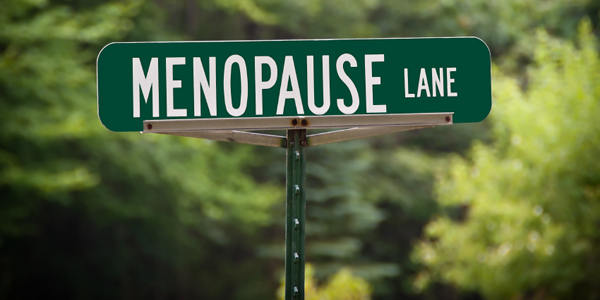Almost Everything You Wanted to Know About Menopause
Last week I got a text message from a friend of mine.I'm not in menopause like I thought I was. I got my period. After three months.
Well, friend, you may not be in the menopause, but you're certainly on your way. As am I. We all are, in fact. I wanted to find out more about menopause so that I could better prepare myself to stay healthy and happy as I march towards that next stage of my life. I sat down to chat, via telephone, with Dr. Marla Shapiro, a leading expert on women's health, aging, and menopause.

What are some of the symptoms of menopause?
What people don't recognize is that menopause doesn't happen overnight. What we think of as menopause symptoms are actually peri-menopause symptoms, which can happen for years. These symptoms can be erratic or inconsistent, and include:
- Irregular menstruation: duration, flow, or frequency
- Hot flashes, night sweats
- Hormonal instability
What should I look out for during this time in my life?
When experiencing the process towards menopause, women experience both physical and emotional changes. It's very important to talk to your family doctor, ask questions and watch out for the following considerations:
- Accelerated bone loss (if at increased risk for bone loss begin having checked prior to 65)
- Blood pressure
- Cholesterol
- Blood sugar
- Heart health
- Breast health
- Emotional health & relationships
- Big life changes such as an empty nest
Menopause is the life stage after you stop having your period.
Peri-menopause is the time leading up to the menopause and the point when you start having symptoms.
Is there anything else women should think about?
One aspect of this life stage not commonly discussed is vaginal atrophy. This condition involves thinning and inflammation of the vaginal walls due to a decrease in Estrogen. Many women ignore or don't know about vaginal health, and are under the myth that if they’re not sexually active they don’t have to worry about vaginal atrophy. It often goes untreated because there are doctors who feel that if their patient isn't bringing up symptoms then the problem doesn't exist, while patients are embarrassed to talk about it.
Untreated, vaginal atrophy will get progressively worse, causing bleeding, pain, and discomfort. It also affects bladder health. There are options for relief and treatment such as lubricants, moisturizers, and local application of estrogen.
It's very important that in and around all of your different life stages, you have a collaborative relationship with your doctor. You should never feel judged, and there's nothing you shouldn't be able to talk about. For example, talk to your doctor about your moods. A lot of women worry about sex as they go through menopause. Early emotional issues can be related to low estrogen-mood changes, but should abate once in menopause. If they persist, a conversation with your doctor is warranted.
What about weight gain? A lot of women become heavier after menopause.
Weight gain is related to aging and poor lifestyle and diet, not menopause. Many women do see a redistribution of fat to the abdominal area, but the actual weight gain is not hormonally mediated.
It's important to eat smarter, eat healthier, have a combination exercise regime of weights and and cardio. Muscle is very important in maintaining overall health, especially bone health.
Are there any health risks when you’re entering menopause?
There definitely are certain health factors to think about.
In peri-menopause, women experience accelerated bone loss so bone health is particularly important. Keeping up your aerobic activity and resistance training will help maintain the bones.
Women lose the cardiac protection they get from estrogen, so it's key to minimize risk factors, like smoking as you go into menopause.
To understand a women's particular health concerns, doctors look at overall modifiable risk factors (such as diet, exercise, smoking, alcohol consumption) and then look at non-modifiable factors like family history of heart disease, cancers, breast health, bone health.
So what can we do to prepare?
It’s never too late to make a healthy change to mitigate potential side effects or health risks associated with menopause. When you're younger, think about Vitamin D and Calcium and make sure you exercise.
When you're experiencing symptoms, keep a food diary and watch for triggers such as foods that may bring on hot flashes. Some examples are alcohol, chocolate, or spices.
There is no evidence that any of the botanicals and herbals have any effect on hot flashes. Also, natural does not mean without harm-buyer beware. Ask an expert about any remedies you may be considering.
Any final thoughts?
Remember that menopause is the next stage of your life. Your symptoms can be treated, you can watch your diet and exercise to maintain weight and improve self-esteem.
Be relationship oriented. Look at other ways to be intimate. Involve your partner and talk to him and create time and space to reinvest in the relationship.
Focus on the positives. Think of this time as one of renewed relationships and new opportunities.
You can watch Dr. Marla and friends on CTV news channel Monday and Thursday at 7:30 pm and on CTV on Saturdays at 2:30.
* * * * *
What aspect of menopause concerns you the most? Share your thoughts in the Comments section below.
Related:
Welcome to Peri-Menopause Lane
Osteoporosis Prevention: Five Tips for Men and Women
How to Prevent Heart Disease: Top 10 Tips


